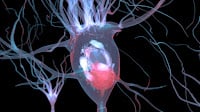Adult ADHD Linked to Later Lewy Body Disease, Cognitive Impairment

Adults with attention-deficit/hyperactivity disorder (ADHD) may be at increased risk of dementia and cognitive impairment compared with those without ADHD, according to a report in the American Journal of Geriatric Psychiatry. Adults with ADHD seem particularly susceptible to dementia associated with Lewy body disease, a disorder characterized by abnormal deposits of proteins called Lewy bodies in the brain that results in various forms of cognitive impairment, delirium-like symptoms, Parkinson’s-like movement problems, and hallucinations.
“Determining whether there is an association between ADHD and subsequent conversion to a specific type of dementia is important,” wrote lead author Ángel Golimstok, M.D., of Hospital Italiano, Buenos Aires, and colleagues. “This information could generate opportunities for prevention and early treatment.”
The researchers followed 161 patients with ADHD and 109 without ADHD aged 45 to 70 for an average of 12 years to determine the rates of dementia and cognitive impairment. Both groups presented at a neurology service between February 2, 2007, and December 31, 2012, because of cognitive complaints or a family history of cognitive impairment or ADHD. Patients in either group taking psychoactive drugs including ADHD medications were excluded, except for those taking a single benzodiazepine or hypnotic for insomnia.
At the end of the follow-up, 27 patients with ADHD developed dementia (16.8%) compared with just four patients in the non-ADHD group (3.7%). Of the 27 ADHD patients with dementia, 19 also had Lewy body disease. The incidence of non-amnestic mild cognitive impairment (MCI) was also higher in the ADHD group (108 patients) compared with the non-ADHD group (19 patients); many of these ADHD patients with MCI also had Lewy body disease, and the authors noted that Lewy body-related cognitive problems usually do not affect memory.
In fact, all the core symptoms of Lewy body disease were more prevalent in the ADHD group than the non-ADHD group: REM sleep behavior disorder, Parkinsonism, delusions and hallucinations, cognitive fluctuations, decreased sense of smell, and syncope (fainting).
“Future studies should determine if ADHD represents a prodromal phase of the disease or if it is a risk factor. The connection between ADHD and dementias, in general, seems to be related more to comorbidity with depression than to shared pathophysiological mechanisms,” the authors wrote.
For related information see the Psychiatric News article “Symptoms, Impaired Function of ADHD Often Persist Beyond Childhood.”
(Image: Getty Images/iStock/Marcin Klapczynski)
Don't miss out! To learn about newly posted articles in Psychiatric News, please sign up here.





